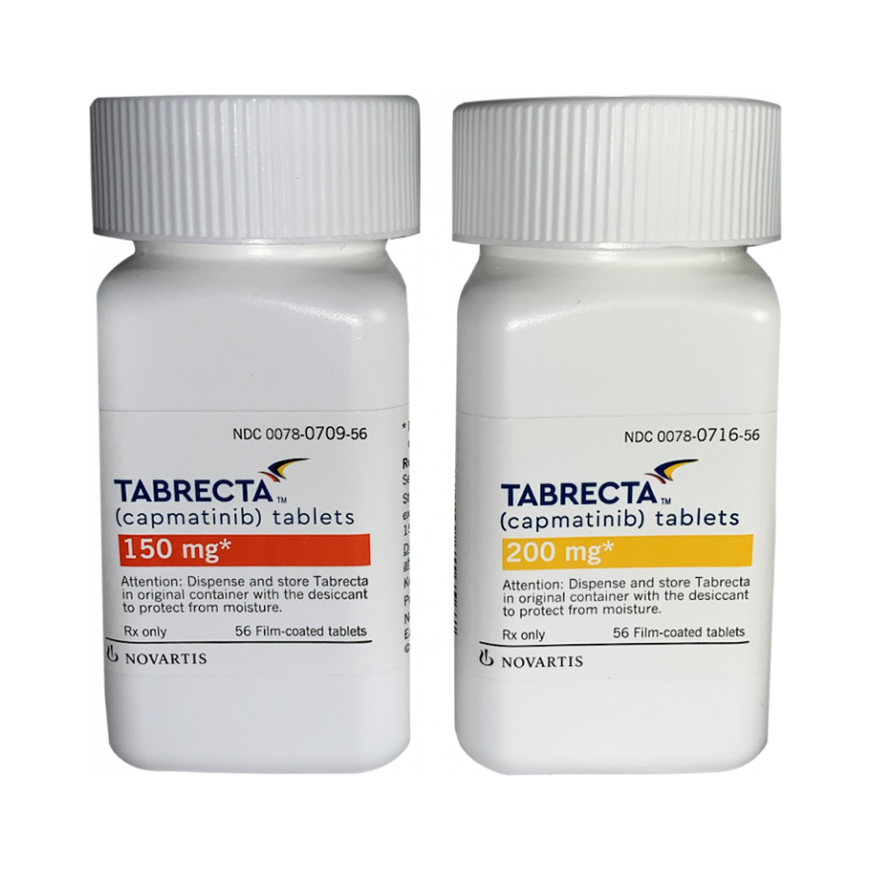Keytruda (pembrolizumab) vs Tabrecta (capmatinib)
Keytruda (pembrolizumab) vs Tabrecta (capmatinib)
Keytruda (pembrolizumab) is an immunotherapy drug that works by blocking the PD-1 pathway, which helps the body's immune system to detect and fight cancer cells, and is commonly used for various types of cancers, including melanoma, lung, head and neck, and others. Tabrecta (capmatinib), on the other hand, is a targeted therapy specifically designed to inhibit the activity of the MET gene in cases where there are mutations or amplification, and is approved for the treatment of non-small cell lung cancer (NSCLC) with MET exon 14 skipping mutations. When deciding between Keytruda and Tabrecta, it is crucial to consider the specific type of cancer, its molecular profile, and the presence of specific genetic mutations, as Tabrecta is only indicated for cancers with a certain genetic alteration, while Keytruda has a broader range of indications but depends on PD-L1 expression and other factors.
Difference between Keytruda and Tabrecta
| Metric | Keytruda (pembrolizumab) | Tabrecta (capmatinib) |
|---|---|---|
| Generic name | Pembrolizumab | Capmatinib |
| Indications | Various cancers including melanoma, lung cancer, head and neck cancer, Hodgkin lymphoma, and others | Metastatic non-small cell lung cancer (NSCLC) with MET exon 14 skipping mutations |
| Mechanism of action | Programmed death receptor-1 (PD-1) blocking antibody | MET kinase inhibitor |
| Brand names | Keytruda | Tabrecta |
| Administrative route | Intravenous infusion | Oral |
| Side effects | Fatigue, musculoskeletal pain, decreased appetite, pruritus, diarrhea, nausea, rash, pyrexia, cough, dyspnea, constipation, pain in extremity, and headache | Nausea, vomiting, fatigue, edema, decreased appetite, and dyspnea |
| Contraindications | None listed specifically; use with caution in patients with autoimmune disease or those receiving immunosuppressive therapy | None listed specifically; use with caution in patients with hepatic impairment or renal impairment |
| Drug class | Anti-PD-1 monoclonal antibody | Small molecule tyrosine kinase inhibitor |
| Manufacturer | Merck & Co. | Novartis |
Efficacy
Efficacy of Keytruda (pembrolizumab) in Lung Cancer
Keytruda, known generically as pembrolizumab, is a highly effective immunotherapy drug used in the treatment of various forms of lung cancer, including non-small cell lung cancer (NSCLC) and small cell lung cancer (SCLC). As a programmed death receptor-1 (PD-1) blocking antibody, Keytruda works by enhancing the body's immune system to help detect and fight cancer cells. It has shown significant efficacy in improving survival rates in patients with metastatic NSCLC, particularly those whose tumors express PD-L1 with a proportion score of 1% or more, and who have previously undergone chemotherapy.
Keytruda has been evaluated in multiple clinical trials, with many studies demonstrating a significant improvement in progression-free survival (PFS) and overall survival (OS) compared to chemotherapy alone. In the KEYNOTE-024 study, for instance, Keytruda significantly improved median PFS and OS in patients with advanced NSCLC with high PD-L1 expression, leading to its approval as a first-line treatment. The drug's efficacy is also noted in its ability to maintain a higher quality of life and lower rates of treatment-related adverse effects compared to traditional chemotherapy.
Efficacy of Tabrecta (capmatinib) in Lung Cancer
Tabrecta, or capmatinib, is a targeted therapy approved for the treatment of adult patients with metastatic NSCLC that have mutations leading to mesenchymal-epithelial transition (MET) exon 14 skipping. This oral medication is a MET inhibitor that specifically targets the genetic alterations in the MET gene, which can drive the growth and spread of cancer cells. Capmatinib has shown promising efficacy in patients with MET exon 14 skipping mutations, which are present in a small percentage of NSCLC cases.
The approval of Tabrecta was based on the results of the GEOMETRY mono-1 trial, which demonstrated that capmatinib provided a high overall response rate (ORR) in previously treated as well as treatment-naive patients with MET exon 14-altered NSCLC. The study showed that capmatinib led to rapid and durable responses, offering a new line of treatment for patients with this specific genetic profile. The efficacy of Tabrecta, as seen in the trial, offers hope for improved outcomes in a subset of lung cancer patients who previously had limited treatment options.
Regulatory Agency Approvals
Keytruda
-
European Medical Agency (EMA), European Union

-
Food and Drug Administration (FDA), USA

-
Health Canada

-
Therapeutic Goods Administration (TGA), Australia

-
Medsafe (NZ)

Tabrecta
-
European Medical Agency (EMA), European Union

-
Food and Drug Administration (FDA), USA

-
Pharmaceuticals and Medical Devices Agency (PMDA), Japan

Access Keytruda or Tabrecta today
If Keytruda or Tabrecta are not approved or available in your country (e.g. due to supply issues), you can access them via Everyone.org.
How it works

Make an enquiry
Choose the medicine you want to buy, answer a couple of questions, and upload your prescription to speed things up. We’ll get back to you within 24 hours.


Make an enquiry
Choose the medicine you want to buy, answer a couple of questions, and upload your prescription to speed things up. We’ll get back to you within 24 hours.


Breeze through the paperwork
We'll guide you through the required documents for importing unapproved medicine, ensuring you have all the necessary information.


Get a personalized quote
We’ll prepare a quote for you, including medicine costs and any shipping, administrative, or import fees that may apply.


Receive your medicine
Accept the quote and we’ll handle the rest - sourcing and safely delivering your medicine.

Some text on this page has been automatically generated. Speak to your physician before you start a new treatment or medication.
Let's talk
If you have any questions, call us or send us a message through WhatsApp or email:
Contact us




